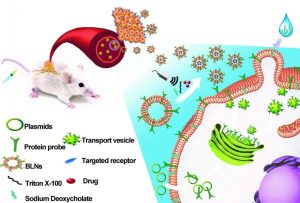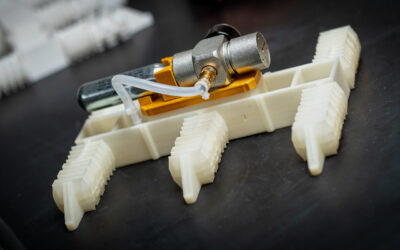Targeted drug delivery to tumors and other cell populations is key in the development of precision medicine solutions. So far, a variety of ligand-targeted nanovehicles aimed to deliver drug to specific tissues and cells have been fabricated. Nonetheless, major challenges still remain with regards to the facile production of the targeting protein/peptide ligands, and to the correct spatial orientation and activity of these macromolecules, once attached to the target surface.
To overcome these challenges, in their article published in Advanced Materials, researchers from Xiamen University develop a versatile theranostic nanoplatform that selectively targets a wide variety of specific cell populations and tumor tissues. Following biomimetic synthesis strategies, which mainly involve simulating or using the natural biosynthetic pathway, they prepared bio-functionalized liposome-like nanovesicles (BLNs) that are capable of artificially displaying a wide variety of targeting peptide or protein ligands for targeted drug delivery.

As a proof-of-principle, a human epidermal growth factor and a HER2-targeting ligand were selected to generate BLNs with tumor-targeting ligands. Once genetically engineered, these BLNs were directed on the cell surface and integrated into the giant plasma membrane.
Similar to the secretion of naturally occurring extracellular vesicles, called exosomes, where the transport of protein, miRNA or mRNA from one cell to another relies on specific adhesion of proteins, Liu and co-workers showed that their synthetic BNLs demonstrate a wide variety of targeting peptide and protein ligands for targeted drug delivery.
The new ligands were easily subjected to post-translational modifications via biosynthetic routes, while their size distribution, uniformity and stability were effectively controlled using proper surfactants. In addition, when compared to other synthetic liposomes, the biosynthetic BLNs demonstrated higher biological activity and capability to successfully target tumors.
As stated by the researchers, “To the best of our knowledge, so far genetically engineered plasma membrane nanovesicles have not been utilized to synthesize membrane-coating nanotheranostics, neither have they been applied as a ligand-targeted theranostic nanoplatform with improved safety profiles. We envision that this new biomimetic strategy can provide a platform for the synthesis of different ligand-targeted nanovesicles that can mediate selective drug delivery to specific tissues”.

















